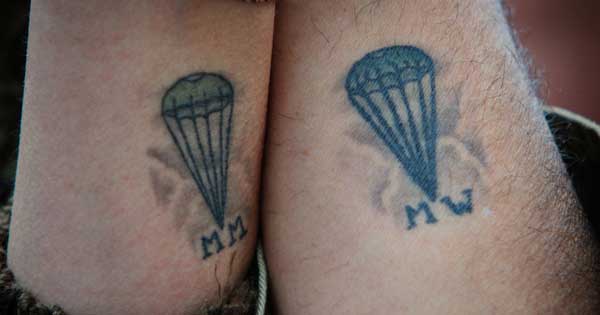
KANDAHAR CITY—The swastika is green and fading, blurring beneath the commander’s skin like a memory. He has told the Americans the tattoo has nothing to do with Nazis. It’s just a design, older than fascism and simple, a brief intersection of lines above his right thumb. The scribble of a child. Like the other tattoos decorating his hands—dots, lines, vague shapes—it is small, the ink and the story behind it shifting with a muscle’s twitch or the nature of the audience. I have seen these markings only in men who fought the Soviets, or the Taliban, or both. They have all been Sunni, though their Islam seems to forbid such marks.
This man is a lieutenant colonel in the Afghan National Police, chief in a sub-district of northwestern Kandahar City. I meet him in a small police station where he lives with his men and a platoon of American soldiers who train them, the two forces working together, preparing for the end, when the Americans leave. Kandahar is quieter these days. But the war is never far away. One reminder sits a few blocks west: the compound where Mullah Omar, leader of the Taliban, once lived. Another is this tattooed man.
Four times suicide bombers have tried to kill him. The first three were shot or captured before they could detonate. The fourth bomber came in a speeding vehicle, unstoppable, and the blast severed the colonel’s left index finger and his right big toe. It also killed his left arm. The arm, withered and limp, remains attached. He occasionally uses it like a flail, swinging at children who come too near.
The colonel is 38 and has a dark mustache. He is not old enough to have fought the Soviets, but he was there, watching. When I ask what he did after the Soviets departed, during the civil war and then later, when the Taliban took control, he grins.
“I was against them,” he says. “A simple man against them.”
The American soldiers put it differently. “We hear he was a badass.”
After the American invasion, he joined the national police force and became a commander, fighting the Taliban in the Arghandab Valley, southwest of the city, one of Afghanistan’s most dangerous zones. The Taliban soon became obsessed with the colonel’s destruction. One bomber, two bombers, three bombers, four. In 2009, the last nearly succeeded.
When the colonel recovered as far as he could, he was transferred to the city and given command of the sub-station. A small role compared to his former one. He wants me to understand that he had once been powerful. In line to become a big commander, he says, perhaps police chief of the entire province. That job now belongs to a younger man who cannot read, who is later accused of awful crimes, but who is whole.
The colonel tells me this while lying on a thin cushion in his room after dinner. His belly like a tire, a few young officers arranged around him. A servant boy pours water over the hand that still functions, and the swastika darkens under the stream. A lieutenant sets a silver spittoon before him. The colonel fills his lip with green tobacco and admits one worry. When U.S. forces leave Afghanistan, he says, the Taliban will awaken.
“They will come right back. No question. You Americans shouldn’t leave. You should stay and build permanent bases here.”
I ask if the Taliban have lately tried to kill him. No, he says. Perhaps they are satisfied with ruin.
The next day another man repeats the colonel’s concern. Don’t leave, he says. This man is older, a minor politician in the city, bearded and turbaned. He fought the Soviets and the Taliban, and he knew the colonel when the colonel was a boy.
He is instantly friendly and laughs while telling stories of houses he once torched and traitors he once shot. With glee and thick fingers he traces the paths of rockets he sent soaring toward Russian helicopters. Somehow I accept all this about him, making room for it and laughing along, as if the joke were not about death at all.
“Are you tired of fighting?” I ask.
“Yes, I’m tired of fighting! That is why I want you to stay!”
“Won’t the police and the army be able to handle things?”
“No,” he says. “When you leave the Taliban will instantly return.”
Ten years of effort erased. In his right hand, above the thumb, there is a fading tattoo of a heart. Just the simplest outline, a shape I have seen carved into the medieval foundation stones of the Louvre and that I remember from fourth-grade Valentine cards. As though in answer to the colonel’s swastika.
I wonder if the heart came before or after he fired the rockets and burned the houses down. I wonder what he thinks of the American soldiers, of their war and their ink, rich as tapestries, embroidered on necks and arms.
There is no time for asking. We rise from the floor and shake hands. His grip is powerful. My thumb covers the heart.


